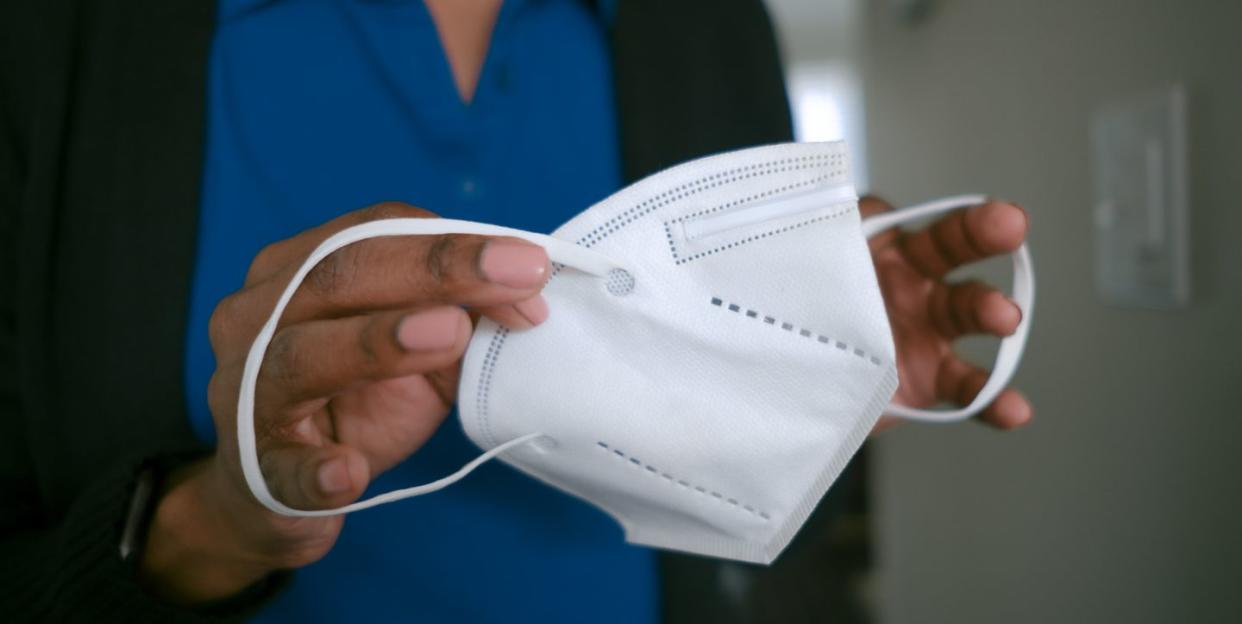How to Make Sure Your N95/KN95 Mask Is Legit

As the Omicron variant of the Covid-19 pandemic spreads across the country, finding the right mask to protect yourself has gotten harder within previous months. The Centers for Disease Control and Prevention has updated its mask guidance to fight the spread appropriately, advising against cloth masks and surgical masks alone to protect against the virus.
As of press time, the CDC is advising the general public to upgrade to N95 and KN95 masks to protect against the Omicron variant. These respirators filter out 95 percent of particles that are 0.3 microns or larger in diameter, Dr. Michael Schivo, a pulmonologist and an associate professor of internal medicine at UC Davis Health, previously told Men's Health.
Previously reported by Men's Health, the CDC is warning against several N95 respirators falsely claiming to be approved by NIOSH flooding the market, and therefore won't effectively protect you from COVID-19, especially the Omicron variant, spread. NIOSH is the National Institute for Occupational Safety and Health (NIOSH) in the U.S., providing the standards for protective N95 face masks across several occupations that require them.
KN95 masks are made abroad in China, thus adhering to Chinese standards. According to the CDC, as many as 60 percent of KN95 masks available could be fakes.
How do you know which masks are legit, and even more so where to get one? Stella Clavecillo, D.O. a board certified internal medicine doctor based in San Francs, shows you how to determine whether the masks you bought is real or counterfeit and what to look for to determine real masks from fakes.
ISO/IEC 17025 lab tested
This is a standard recommended by the CDC to ensure the mask meets the protective standards of its country of origin. Check if the manufacturer is listed here.
Visible brand logo and GB2626-2019
The brand of mask should be visible somewhere on the mask itself. Additionally, GB2626-2019 is the mandatory standard for respiratory protection masks.
"GB2626 gives reassurance that manufacturer made mask [with] highest standard per Chinese guidelines," writes Dr. Stella in a comment. "If GB ends in 2006 it’s still legit if not [past the expiration date].
Shouldn't say "NIOSH/FDA-approved"
To confirm that the KN95 you’re buying is legitimate, make sure the manufacturer is listed on the FDA's Emergency Use Authorization list. The CDC also has a list of NIOSH-approved manufacturers to ensure your mask is certified for your protection. Simply saying so on the box or mask is not approval.
Check the expiration date
Masks absolutely have expiration dates. If the mask you purchased is past its expiration date, you may not be protected.
Make sure the packaging is properly sealed
A banged up or partially opened box is an obvious sign of damage or tampering. Don't use a mask with damaged packaging for your own safety.
No quality control issues
Check if all the masks are identical and there aren't any mix-ups. If not, they're likely safe. to us.
You Might Also Like

